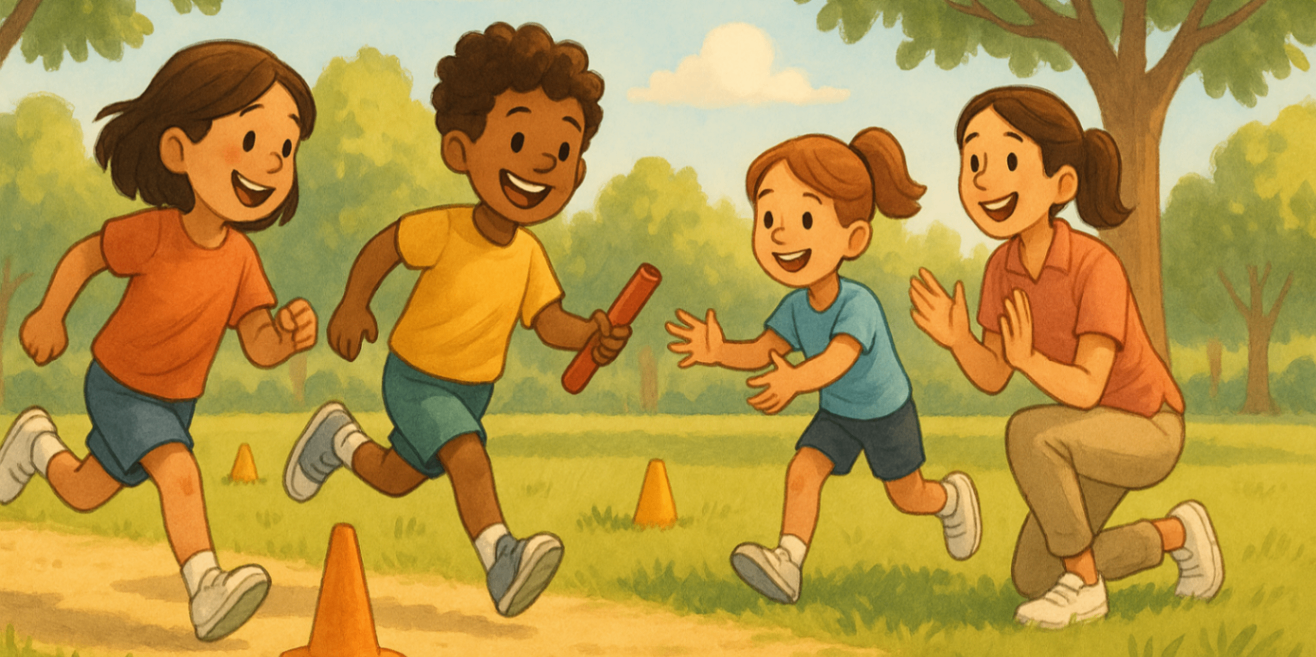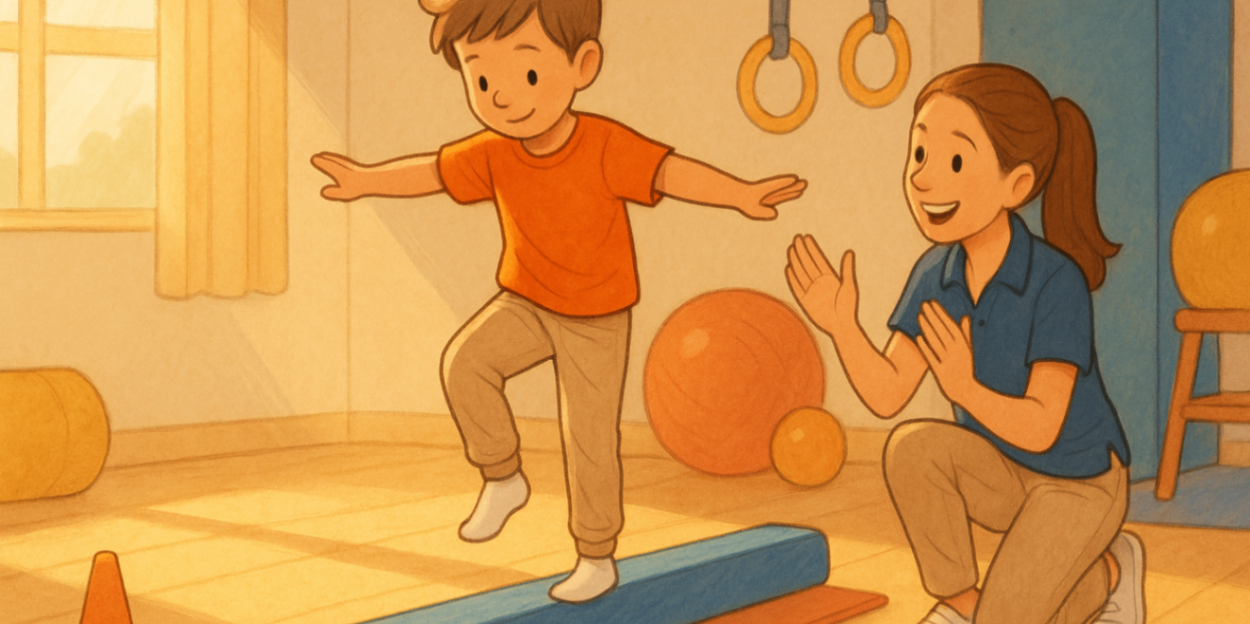
how paediatric exercise physiology for anxiety helps kids
12 September, 2025
Is your child struggling with feelings of worry or nervousness? You’re not alone. Many parents are seeking effective ways to support children’s mental health. Paediatric exercise physiology offers a positive, science-backed approach to managing anxiety through movement.
It’s not just about playing sports — it’s about using structured, personalised activity to help children feel calmer, more confident, and better equipped to manage life’s challenges. Let’s explore how this specialised field can make a real difference.
Key Highlights
-
Paediatric exercise physiology uses structured physical activity to support children’s mental health and emotional well-being.
-
Regular movement naturally reduces anxiety symptoms by releasing “feel-good” hormones.
-
Tailored exercise programs build resilience, confidence, and self-esteem in kids.
-
Group physical activity fosters social skills and positive peer connections.
-
Exercise physiology improves focus, cognitive function, and emotional regulation.
-
Programs give children healthy coping tools to manage stress throughout life.
What Is Paediatric Exercise Physiology?

Paediatric exercise physiology is a specialised field where accredited exercise physiologists (AEPs) use evidence-based movement programs to improve children’s physical and emotional health.
Unlike personal trainers, AEPs hold degrees in exercise science and are trained to work with medical and mental health conditions. Their goal is to design fun, structured activities that promote both physical development and mental well-being, including support for children with anxiety.
Common Causes and Signs of Anxiety in Kids
Anxiety in children may stem from:
-
School stress
-
Social difficulties
-
Developmental conditions (e.g. ADHD)
Common signs include:
-
Trouble concentrating
-
Avoiding social situations
-
Frequent worries or fears
-
Stomachaches, headaches, or other physical complaints
When unaddressed, these symptoms can interfere with learning, friendships, and overall well-being. Exercise physiology provides a healthy, constructive outlet.
The Link Between Movement and Childhood Anxiety
Physical activity directly impacts the brain by releasing endorphins and serotonin — natural chemicals that reduce stress and boost mood.
Structured exercise physiology programs target both physical health and emotional regulation, giving children reliable tools to manage their feelings. Unlike unstructured play, these sessions are tailored to achieve specific outcomes: calmer moods, better focus, and greater confidence.
Physical Activity and Emotional Regulation
One of the most powerful benefits of regular physical activity is its direct impact on emotional regulation. For a child struggling with anxiety, emotions can feel overwhelming and difficult to control. Exercise provides a physical outlet for this pent-up energy and stress. It helps balance the body’s stress hormones, like cortisol, while boosting mood-enhancing chemicals.
This process helps improve cognitive function, allowing children to think more clearly and focus better. When a child engages in consistent physical activity, they are actively training their brain and body to manage stress. This contributes to good mental health and gives them a sense of control over their feelings.
Here’s a look at how different types of exercise can help:
|
Activity Type |
Brain and Emotional Benefit |
|---|---|
|
Aerobic Activities (e.g., walking, running) |
Boosts serotonin to improve mood and lowers stress hormones. |
|
Stretching & Yoga |
Calms the nervous system and improves mental focus. |
|
Game-Based Activities |
Enhances decision-making skills and cognitive flexibility. |
|
Strength Training |
Builds confidence and a sense of accomplishment. |
How Exercise Physiology Sessions Work for Kids

So, what happens during an exercise physiology session? An accredited exercise physiologist starts by getting to know your child and understanding their specific needs and challenges. These sessions are designed to be fun, engaging, and supportive, ensuring your child feels comfortable and motivated. The focus is on using physical activity as a form of therapy to achieve clear health benefits.
The physiologist will guide your child through a series of movements and activities that are part of a personalised plan. This isn't a one-size-fits-all gym class; every exercise is chosen to help improve motor skills, build strength, and enhance emotional well-being. By participating in these structured sessions, children learn how to use their bodies to calm their minds, building resilience and confidence with every step.
Tailored Exercise Programs by Paediatric Exercise Physiologists
A key element of paediatric exercise physiology is the creation of tailored exercise programs. Exercise physiologists understand that every child is unique, with different strengths, challenges, and emotional needs. They begin with thorough individual assessments to gather a complete picture of your child's physical and emotional state.
Based on this assessment, they move on to program design, crafting a plan that is specifically suited to your child. This ensures the activities are not only safe and effective but also enjoyable, which is crucial for keeping kids engaged and motivated on their journey to better health.
Individual Assessments and Program Design
The journey begins with comprehensive individual assessments. During this phase, the exercise physiologist will evaluate your child's current physical fitness, coordination, balance, and motor skills. They also take the time to understand your child's emotional state, including their specific anxieties and triggers. This holistic view is crucial for designing a truly effective program.
Once the assessment is complete, the physiologist designs a personalised exercise program. This plan will include specific types of exercise aimed at addressing your child's needs. For a child with anxiety, the program might focus on rhythmic, calming activities like swimming or walking, combined with exercises that build confidence and social skills.
The goal is to create a plan that not only improves physical health but also teaches essential life skills for managing emotions. These exercise programs are dynamic and can be adjusted as your child makes progress, ensuring they continue to be challenged and supported.
Supporting Your Child’s Journey: Parental Involvement & Social Skills
 Your role as a parent is incredibly important in this process. Parental involvement and social support are pillars of a successful exercise physiology program. When you actively encourage and participate in your child’s journey, you reinforce the positive habits they are learning.
Your role as a parent is incredibly important in this process. Parental involvement and social support are pillars of a successful exercise physiology program. When you actively encourage and participate in your child’s journey, you reinforce the positive habits they are learning.
Beyond just physical movement, these programs are designed to help your child build confidence and social skills. Through group activities and guided interactions, children learn to form positive relationships, communicate effectively, and work as a team, all of which are crucial for overcoming social anxiety.
How Parents Can Encourage and Support Exercise
Your encouragement can make a huge difference in helping your child stick with regular physical activity. One of the best things you can do is provide consistent social support. When your child knows you’re on their team, they’re more likely to feel motivated, especially on days when their anxiety disorders make it tough to get moving.
Parental involvement doesn't have to be complicated. Simple actions can show your child that you value their efforts and well-being. Try to focus on progress, not perfection, and celebrate small victories along the way.
Here are a few tips to help you support your child:
-
Be a role model: Let your child see you enjoying physical activity yourself.
-
Make it fun: Find activities your whole family can enjoy together, like bike rides or walks in the park.
-
Set achievable goals: Work with your child to set small, manageable goals to build momentum.
-
Focus on enjoyment, not performance: Emphasise how good it feels to move rather than focusing on winning or being the best.
Building Confidence and Social Connections Through Movement
One of the wonderful side effects of structured exercise is the boost in confidence it provides. As children master new skills and see their physical strength improve, their self-esteem grows. This newfound confidence often translates into other areas of their life, helping them feel more capable of handling social situations that once seemed daunting.
Many exercise physiology programs include group activities, which create natural opportunities for building social connections. In these supportive settings, children learn essential life skills like teamwork, communication, and empathy.
Working together toward a common goal during a game or activity helps anxious children practice their social skills in a low-pressure environment. They learn to trust others, share experiences, and form friendships, all while having fun and moving their bodies. These positive interactions are fundamental to reducing social anxiety and building a strong support network.
Paediatric Exercise Physiology and the NDIS
The National Disability Insurance Scheme (NDIS) recognises paediatric exercise physiology as an allied health service. Families may receive funding for:
-
Assessments
-
Tailored exercise plans
-
Ongoing sessions
This means families in Liverpool and Canterbury can access therapy designed to support both physical and mental health, with costs covered by their child’s NDIS plan.
Conclusion
Paediatric exercise physiology offers children with anxiety a safe, effective, and enjoyable pathway to better mental health. Through movement, kids can develop resilience, confidence, and healthier coping skills for stress.
With the right therapist and family support, exercise physiology helps children thrive — physically, socially, and emotionally.
Interested in exploring this therapy for your child? Book your consultation now to get started.
Frequently Asked Questions
How often should a child with anxiety participate in exercise sessions?
For children with anxiety disorders, consistency is key. Participating in exercise physiology sessions two to three times a week is often recommended to see consistent health benefits. This frequency allows for regular physical activity, which helps in managing anxiety, without causing burnout.
Are exercise physiology programs suitable for children experiencing both anxiety and depression?
Yes, absolutely. Exercise physiology is highly beneficial for young people experiencing symptoms of depression alongside anxiety. Physical activity is a natural mood elevator that can improve mental health. These programs are designed to address the complex emotional needs of children in a supportive and holistic way.
Can exercise physiology help improve social skills in anxious children?
Yes, improving social skills is a key benefit. Many exercise physiology programs include group activities that encourage teamwork and communication from a young age. This helps anxious children practice essential life skills and build confidence in social settings in a fun, low-pressure environment.
.svg)

















